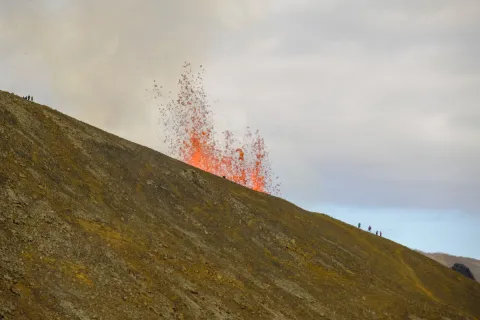
University of Iceland's research scientists are part of a research team on sustainable tourism in the Arctic that recently published a report: Arctic Tourism in Times of Change - Uncertain Futures: From Overtourism to Re-starting Tourism.
Prior to the outbreak of COVID-19, at the beginning of 2020 many destinations in the circumpolar region were struggling to attract tourists and build up viable businesses, while others were experiencing rapid and unsustainable growth in tourist arrivals. The project Partnership for Sustainability: Arctic Tourism in Times of Change sought to develop a framework for the sustainability of Arctic tourism.
The project was funded from the Nordic Council of Ministers’ Arctic Co-operation Programme 2018–2021 and this report presents the findings from the last sub-project titled: Uncertain futures: From Overtourism to Re-starting Tourism. The report is based on a workshop attended by researchers, students, industry representatives, policy-makers and entrepreneurs discussing overtourism, the impact of COVID-19 and sharing visions about re-starting and rethinking tourism.
A key for sustainable and dynamic tourism adaptation to overtourism and ‘undertourism’ is that entrepreneurs and other tourism actors are aware that they are part of a tourism system and that they know their place within that system. By understanding this, the tourism actors are better equipped to plan and respond to crises that potentially will affect other actors in the system first, but eventually influence everyone in the system.
While COVID-19 hit tourism hard across the Arctic, there is a considerable difference between and within regions when it comes to how much tourism has decreased. The pandemic revealed the vulnerability of the tourism product the way it has been developed in many Arctic regions and communities. It opened a space for reconsidering tourism growth and the negative impacts of tourism on climate and biodiversity, and communities. Re-consideration and re-starting of tourism in times of COVID-19 include, but are not limited to, questions on the value base of tourism business and tourism economy, how to build up valuable tourism products or experiences that are also of value and that matter for local communities and well-being of humans and other actors, such as the environment and the flora and fauna that play a part in that performance. The report underlines the need to build tourism up with conversation and collaboration within the field and local communities in the Arctic.
Research scientists from seven universities in the Nordic countries and Canada were involved in writing the report; including Gunnar Þór Jóhannesson, professor of tourism studies at the University of Iceland, and Johannes Welling, project manager at the University of Iceland's Research Centre in Hornafjörður.
The report can be found on the Nordic Council of Ministers' website